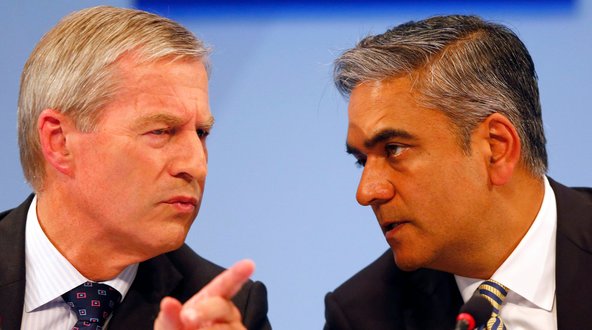MADRID — Rodrigo Rato, a former top banking official in Spain and former managing director of the International Monetary Fund, on Thursday became the most prominent banker to appear in a Spanish court since the start of the country’s financial crisis.
Mr. Rato was called to answer claims that he and fellow directors at Bankia presented misleading accounts for the lender. He testified behind closed doors for nearly three hours and did not make a public statement afterward.
Mr. Rato, the former executive chairman of Bankia, and 32 other former executives and board members were named in a criminal investigation that was ordered this year by a judge from the National Court.
Neither Mr. Rato nor the other executives have been formally charged with any crime. But prosecutors have accused Mr. Rato and the others of presenting inaccurate accounts when Bankia was listed as a public company in July 2011.
In his court appearance, Mr. Rato denied any wrongdoing and instead argued that Bankia was put under pressure to proceed with the stock listing by both the government and the central bank, according to a person familiar with the testimony who requested anonymity because of the confidential nature of the proceedings.
Mr. Rato, who is also a former finance minister, appeared before Parliament in July of this year to answer similar accusations. At the time, he rejected any suggestion that he or other directors had ignored or hidden Bankia’s pile of bad loans.
The government of Prime Minister Mariano Rajoy nationalized Bankia in early May, two days after Mr. Rato resigned from the bank. A month later, after Bankia’s new management announced that the lender needed €19 billion, or $25 billion, in additional capital, Madrid negotiated a €100 billion E.U. rescue package for the country’s troubled banking sector.
That rescue operation is still under way. On Thursday, the European Commission cleared the restructuring plans of four smaller lenders — Banco Mare Nostrum, Caja España-Caja Duero, Caja3 and Liberbank — that were also left with an unsustainable burden of bad property loans after Spain’s construction bubble burst.
The commission has been reviewing the bailouts of the ailing banks to ensure the government aid does not distort competition in the financial sector. As part of the process, the commission has demanded that the banks make significant cuts.
Spanish banks are set to receive €39 billion of the €100 billion authorized. The banks have already received a total of €13 billion of Spanish government aid since 2010 to help them stay afloat.
Shareholders have watched Bankia’s stock price sink since the initial public offering. Many other investors have also incurred losses on preference shares, a type of convertible debt that Bankia and other banks sold mainly to their retail clients. Mr. Rato was confronted by a large group of protesters Thursday, some of whom screamed insults at him as he made his way into the courthouse.
Bankia’s collapse has had political repercussions because the lender has longstanding ties to Mr. Rajoy’s governing Popular Party. Mr. Rato was finance minister in a previous conservative administration, alongside Mr. Rajoy, who was then the interior minister.
Bankia was the product of a merger of seven cajas, or savings banks, that was engineered as part of a government-directed consolidation of the sector.
Bankia’s initial offering had been hailed in Spain as proof that the financial sector could overcome the consequences of a decade of reckless property lending. Instead, Bankia ended up reporting a loss of almost €4.5 billion in the first half of this year, a record for a Spanish bank.
Article source: http://www.nytimes.com/2012/12/21/business/global/former-top-banker-testifies-in-spain.html?partner=rss&emc=rss
